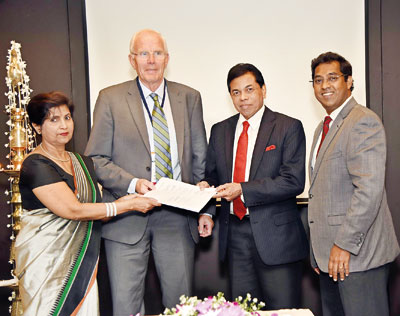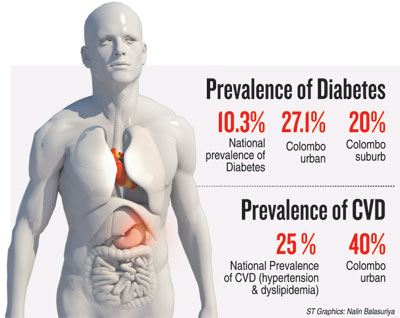News
Battle against NCDs intensifies

It was time for a photograph after signing the ‘Sri Lanka Diabetes and Cardiovascular Initiative’. From left are Sri Lanka Medical Association President Dr. Iyanthi Abeyewickreme, World Diabetes Foundation Managing Director Dr. Anders Dejgaard, Health Services Director-General Dr. Palitha Mahipala and Sri Lanka College of Endocrinologists President-Elect Dr. Manilka Sumanatilleke
The concerted campaign against non-communicable diseases (NCDs) has been intensified with the launch of the ‘Sri Lanka Diabetes and Cardiovascular Disease Initiative’ (SLDCI) in September.
The three-year initiative (2016—2019) is to be undertaken by the Health Ministry, the Sri Lanka College of Endocrinologists (SLCE) and the Sri Lanka Medical Association (SLMA) with funding and supervision by the World Diabetes Foundation.
With Sri Lanka’s strong primary health care (PHC) network, that is where the campaign would be held to catch NCDs which creep up silently, in the early stages and deal with them immediately pre-empting death and serious disability.
It was a momentous milestone when World Diabetes Foundation Managing Director Dr. Anders Dejgaard and Health Services Director-General Dr. Palitha Mahipala, SLCE’s President-Elect Dr. Manilka Sumanatilleke and SLMA President Dr. Iyanthi Abeyewickreme placed their signatures on the initiative document which would bring in nearly US$ 700,000 (more than Rs. 100 million) to battle this scourge confronting modern Sri Lanka.
The specific aim of the SLDCI is the development of a comprehensive, cost-effective and holistic national model for the prevention and control of diabetes and other cardiovascular disease (CVD) risk factors, which would further strengthen and support the existing PHC system. The lead managerial and technical role will be played by the SLCE, while the implementation partner will be the Health Ministry’s NCD Bureau.
The systematic strategy will be under two components:
- Component 1 — Capacity building for early diagnosis and cost-effective management of diabetes and other CVDs at the grassroots or the PHC setting. Training programmes for staff will strengthen the multi-member team care concept and improve accessibility for care both at the PHC level and within the maternal and child health (MCH) network. An example would be Obstetricians & Gynaecologists working in tandem with Endocrinologists in a ‘shared-care model’ in the treatment of women.
The training will be for PHC staff including doctors/registered medical officers and allied health workers, field midwives, public health inspectors, pharmacists and support staff and staff involved in the secondary and tertiary care diabetes centres and obstetricians and staff of ante-natal clinics.

The other areas of focus will include the improvement of the availability of basic medications and technology such as essential drugs, laboratory facilities and equipment for the care of diabetes and CVD. This will include the holistic management of diabetic foot at the grass-roots level and the re-training of Diabetes Educator Nursing Officers (DENO).
Another important measure will be the development of training centres of excellence at provincial and regional levels.
- Component 2 – Improving public awareness on healthy lifestyles with special emphasis on schoolchildren and vulnerable groups and empowering them to make active decisions on lifestyle changes.
Designing and pilot testing an efficient health management information system for diabetes/CVD risks, by the application of mobile and web-based technology which can be integrated into the national Health Information System.

